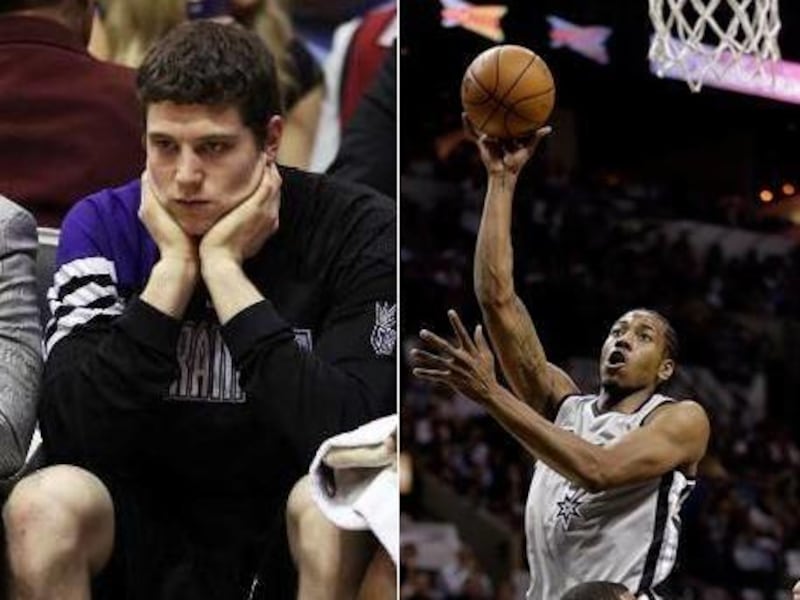There was a time when Kawhi Leonard and Jimmer Fredette were mentioned in the same breath.
The former conference foes were the most talented players in the Mountain West, were leaders of their respective teams, and, at one point, pushed those teams to top-five national rankings during the 2010-11 season.
Since then, the tables haven't just turned. They've been flipped upside down, shoved to opposite sides of the room, and swapped out for newer, startlingly different ones.
Leonard, currently playing for San Antonio in the NBA Finals, is feasting at his, drawing praise for his defense on Miami's LeBron James, a four-time MVP and arguably the best player in the game, on the biggest stage the game has to offer.
Fredette, meanwhile, is resigned to table scraps, and even those he has to fight for. Often there haven't been any for him in Sacramento. A shooting guard condemned to a point guard's body and role, the former consensus national player of the year has — thus far — followed the path of other flamed out college stars like Adam Morrison, Bo Kimble and Ed O'Bannon.
Several factors are in play here, not least of which is Fredette's struggle to find — and keep — his shot in the pros. In his two seasons with the Kings, the former BYU standout has hit just 40.2 percent of attempts. The poor play goes hand in hand with the paltry 16.2 minutes per game he's received, though whether bad play caused fewer minutes or vice versa is open to debate.
Yet the extreme differences between the former college rivals can be chalked up to another factor, maybe one greater than the sum of their talents: team fit.
When the Kings drafted Fredette, they expressed faith that he could make the transition from the "two" to the "one." They followed that up by drafting another point guard, Isiah Thomas.
Then, once the lockout was over, Sacramento signed free agent point guard Aaron Brooks.
Style of play mattered as much as position, and in the Kings' case, that style was duplicated up and down the roster. Shoot-first, me-first. Fredette. Brooks. Marcus Thornton. Tyreke Evans. DeMarcus Cousins.
There were no shots to be had. They had to be taken.
Unfortunately for Fredette, nothing creates tension quite like a highly touted, unproven rookie taking it upon himself to seize those shots ... and then missing them.
Contrast that situation to Leonard's. The Spurs had a gaping hole at small forward, his natural position. Set in the scoring/star department, they asked him to play within the offense and provide shutdown defense: categories that played to Leonard's strengths.
Unlike the unstable and (at the time) potentially departing Kings franchise, San Antonio was and is a model of stability. Duncan has been there for 15 years; head coach Greg Popovich even longer. The team exudes a low-key, workmanlike atmosphere.
Leonard couldn't have dreamed up a better support system as a rookie. In Sacramento, Fredette couldn't have dregged up worse in his nightmares.
It's possible the college-to-pro adjustment is proving to be harder than Fredette (and his fans) anticipated. If anything, he can take heart in another recent college star, J.J. Redick.
J.J. Redick career stats
Like Fredette, Redick was an elite star and scorer in college (26.8 ppg his senior year). Like Fredette, Redick struggled under huge expectations and little playing time his first few years in the league. Maybe, like Redick, Fredette can turn it around and become a dependable role player.
Yet that goal in and of itself — the hope that Jimmer can one day become what Leonard already is — is the biggest sign yet of how much things have changed.
Matt Petersen is the Sports Web Editor for DeseretNews.com. You can follow him on Twitter at @TheMattPetersen.


